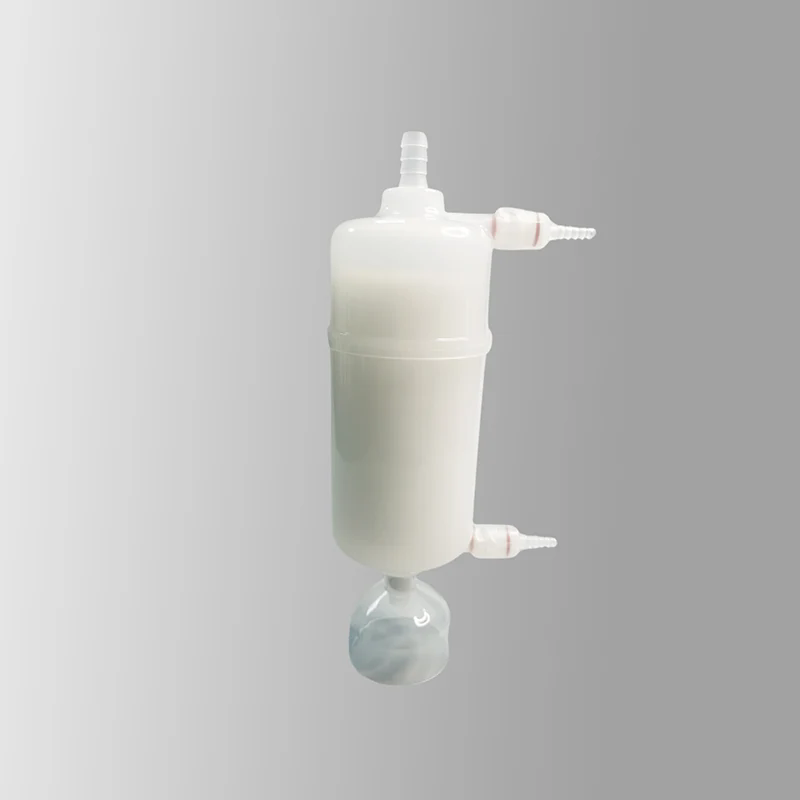What Makes PES Capsule Filters the Future of High-Performance Filtration Technology?
2025-10-30
A PES (Polyethersulfone) Capsule Filter is a high-performance filtration device designed for precision liquid filtration across industries such as pharmaceuticals, biotechnology, food and beverage, and microelectronics. Known for its hydrophilic nature, exceptional flow rate, and low protein binding, PES membrane technology delivers consistent filtration efficiency while ensuring minimal contamination and high product yield.
At its core, the PES Capsule Filter combines advanced polymer chemistry with precise pore size control, enabling reliable filtration for both aqueous and non-aqueous solutions. These capsule filters are pre-assembled, sterilized, and ready to use—eliminating the need for additional housing or assembly steps. This makes them ideal for both laboratory-scale and industrial-scale applications that demand operational simplicity and reliability.
Why PES Capsule Filters Are Preferred Across Industries
The widespread preference for PES Capsule Filters stems from their balance between filtration precision, flow performance, and durability. PES membranes exhibit a uniform pore structure that ensures efficient particle retention while maintaining a high flow rate. Their chemical resistance allows compatibility with a wide range of solvents, buffers, and biological fluids.
Below is a summary of key technical parameters that define the performance of PES Capsule Filters:
| Parameter | Specification | Description |
|---|---|---|
| Membrane Material | Polyethersulfone (PES) | Hydrophilic, low protein binding, high chemical resistance |
| Pore Size Options | 0.1 µm, 0.2 µm, 0.45 µm, 0.65 µm | Suitable for microbial retention, clarification, and sterilization |
| Filtration Area | 500 – 3,000 cm² | Provides scalable performance from lab to production |
| Operating Temperature | Up to 60°C | Compatible with most process conditions |
| Maximum Differential Pressure | 4.1 bar (60 psi) at 25°C | Ensures stable filtration under pressure |
| End Connection | 1/4” to 1” NPT, hose barb, or sanitary flange | Adaptable to multiple system configurations |
| Sterilization Method | Gamma irradiation or autoclaving | Suitable for sterile applications |
These features make PES Capsule Filters a preferred solution for applications where high throughput and product safety are equally critical. The low extractable content of PES membranes prevents contamination, which is vital in sensitive bioprocessing environments.
Additionally, compared with nylon or PVDF filters, PES membranes maintain higher flux and less fouling, which leads to extended filter life and reduced replacement frequency—translating into lower operational costs and improved process efficiency.
How PES Capsule Filters Enhance Process Efficiency
To understand how PES Capsule Filters enhance process performance, it’s essential to look at the mechanisms behind their superior flow dynamics and retention capabilities.
1. Uniform Pore Structure:
The symmetrical pore structure of PES membranes ensures consistent particle retention without compromising flow rate. This allows for fast filtration of large volumes while maintaining microbiological safety standards.
2. Low Protein Binding:
In biopharmaceutical and diagnostic applications, sample loss is a major concern. PES membranes minimize protein adsorption, preserving the integrity of valuable biological products.
3. High Thermal and Chemical Resistance:
PES filters can withstand rigorous cleaning cycles, solvent exposure, and temperature variations—making them reusable in specific non-sterile processes, depending on the system design.
4. Compatibility and Scalability:
From 50 mL laboratory tests to 500 L production batches, PES Capsule Filters offer scalable performance. The same membrane chemistry ensures consistent results across different process volumes.
5. Ease of Use:
Their “plug-and-play” capsule design eliminates the need for complex housing or pre-assembly. This minimizes setup time and potential for cross-contamination, especially in critical manufacturing steps.
Common Applications Include:
-
Pharmaceutical & Biotech: Final filtration of buffers, media, vaccines, and injectable solutions
-
Food & Beverage: Clarification of wines, beers, and soft drinks to maintain flavor stability
-
Microelectronics: Filtration of ultrapure water and process chemicals
-
Laboratory Processes: Sterilization of reagents, media, and analytical samples
Each of these sectors benefits from PES Capsule Filters’ consistent filtration efficiency and reliability, meeting stringent purity and safety standards.
What Trends Define the Future of PES Capsule Filter Technology
The global filtration market is evolving, with increasing demand for efficiency, sustainability, and automation. PES Capsule Filters are at the forefront of this transformation due to several technological and environmental trends:
1. Integration with Single-Use Systems:
In biopharmaceutical manufacturing, the shift toward single-use processing systems has accelerated the adoption of PES Capsule Filters. Their compact, sterile, and disposable design reduces the risk of cross-contamination and supports faster changeover between production batches.
2. Focus on Sustainability:
Manufacturers are exploring recyclable filter housings and more energy-efficient production methods. PES membranes, being durable and thermally stable, require fewer replacements—reducing waste and improving sustainability metrics.
3. Digital Monitoring and Smart Filtration:
Future designs incorporate sensors to monitor flow rates, differential pressure, and filter life in real time. This helps optimize replacement schedules and maintain consistent process quality.
4. Expansion into Emerging Industries:
With the growth of cell therapy, battery manufacturing, and semiconductor fabrication, PES Capsule Filters are becoming integral to maintaining contamination-free environments in these high-precision applications.
5. Innovation in Membrane Chemistry:
Continuous R&D aims to enhance PES membranes with improved fouling resistance, broader solvent compatibility, and antimicrobial coatings—further extending their usability across industries.
Common Questions About PES Capsule Filters
Q1: What is the difference between PES and PVDF Capsule Filters?
A1: PES Capsule Filters are hydrophilic and ideal for aqueous and biological fluids due to their low protein binding and high flow rate. PVDF filters, on the other hand, are hydrophobic and suited for gases or non-polar solvents. PES filters offer better performance in sterile filtration of water-based solutions, while PVDF filters excel in air venting or solvent-based systems.
Q2: How long does a PES Capsule Filter typically last in operation?
A2: The lifespan depends on process conditions such as fluid cleanliness, flow rate, and pressure. Under standard laboratory use, PES Capsule Filters can last for several filtration cycles before fouling occurs. In industrial setups, their longevity is often optimized through pre-filtration or sequential filtration stages. Regular integrity testing is recommended to ensure performance and compliance with process standards.
Why PES Capsule Filters Will Continue to Shape the Future
The rapid evolution of industries like pharmaceuticals and biotechnology demands filtration systems that can deliver both reliability and adaptability. PES Capsule Filters meet these requirements with unmatched filtration clarity, operational efficiency, and compatibility across a wide range of process environments.
Their superior hydrophilic properties, low binding characteristics, and mechanical robustness ensure consistent performance even in the most demanding conditions. As global manufacturing trends lean toward modular, scalable, and single-use systems, PES Capsule Filters will continue to play a crucial role in enhancing process safety, product quality, and cost-effectiveness.
Leading companies such as Memsep have been driving innovation in this space by developing PES Capsule Filters that combine advanced membrane science with ergonomic design. Their solutions meet global regulatory standards while addressing industry-specific challenges across life sciences, food processing, and microelectronics.
For organizations seeking reliable, high-performance filtration solutions tailored to their process needs, contact us to learn more about how Memsep’s PES Capsule Filters can elevate your filtration efficiency and process control.





